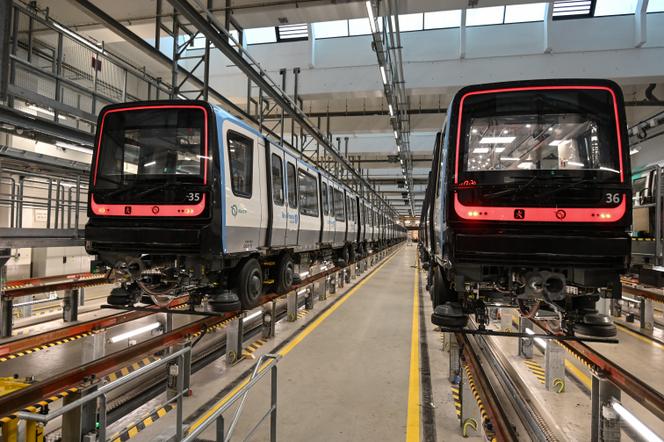


If all goes well, passengers won't notice a thing. On February 26, after two weeks of complete closure, service will resume on Paris's metro Line 14, unchanged, between the stations Saint-Ouen to the north and Olympiades to the south. But in reality, everything will have changed. The line's automatic control software, launched in 1998 by Siemens, will have been replaced by a new-generation tool. "The current system was still very efficient, but insufficient for the extension of the line, which will operate with three times as much rolling equipment as when it was launched," explained Stéphane Garreau, who is in charge of this huge project for RATP, the Paris public transport body. It is to be completed before the 2024 Olympic and Paralympic Games this summer.
Line 14 will be extended in two directions: by 1.5 kilometers to the north, to the new Saint-Denis-Pleyel station, and by 14 kilometers to the south, to Orly airport, with seven new stations. It will be the "lifeline for the Olympics," according to Clément Beaune, who was transport minister until January. The line will link the athletes' village to three major Paris train stations (Bercy, Gare de Lyon and Saint-Lazare), to Orly airport, and will also provide links to reach the Stade de France and the new aquatic center, both in Saint-Denis, north of Paris. The stakes are high: The technical completion of the line is a critical step to determine whether the Paris Games will be a success in terms of transport.
The old automatic control system could handle 35 trains at the same time, with a tight interval of 105 seconds between two trains at peak times. The new system, with its much more powerful computing capacity, will be able to handle 65 trains and, at full speed, reduce the interval to 80 seconds. But a number of steps still need to be taken before the Olympic deadline.
"Delivering Line 14 is a complex operation," admitted Garreau. A series of tests is still required, as well as finalizing the connection of the southern segment to the control system. To do this, the service will be interrupted again every weekend in March, as well as for a week from April 7 to 14, and another week in June. All the dates have not been set yet. All these days and evenings without this key metro line will prove challenging for passengers.
On top of this, there is another big challenge: the delivery of the Saint-Denis-Pleyel station, a project managed by the Société des Grands Projets (SGP). "The safety commission's inspection is scheduled for April 25," explained Bernard Cathelain, a member of the SGP's management board. This will be the last stage before it is considered officially finished: The station is weathertight and waterproof, the elevators and escalators are operational, and the smoke extraction and announcement systems are working. But for the time being, no one is committing to a June inauguration date – "an entirely political issue," explained RATP. And with good reason: President Emmanuel Macron himself wants to attend.
You have 40% of this article left to read. The rest is for subscribers only.
